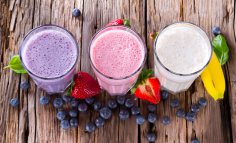legger ut en artikkel jeg fant på nettet om proteiner.. ganske interessant lesing for de som gidder å ta seg tid til det

When whey hit the scene, it seemed that all other proteins would be left in the dust. Whey became the next great supplement trend, outselling casein and egg proteins by a seemingly insurmountable margin. As competition began to heat up in the whey market, companies had to differentiate their whey from their competitors. Soon, terms like "ion-exchange" and "cross-flow microfiltration" began appearing. Athletes had the option of buying whey concentrates, isolates and hydrolysates. Though the public perception that whey is the best protein is still prevalent, the tide seems to be slowly turning once again. At the center of this maelstrom is Twinlabs and MET-Rx. Firing salvo after salvo, these two companies are getting down and dirty. Twinlabs' Michael Colgan believes whey is the superior protein. For MET-Rx's Scott Connelly, it's casein. Who's right?
Proponents of whey such as Michael Colgan who writes for Twinlabs, a company which has been heavily marketing (surprise) Triple Whey Fuel, often miss the point. While it's true whey has certain clear benefits over casein and all other proteins, this doesn't mean that whey is the single best protein for every circumstance. Nor does it mean casein is the best protein, as Scott Connelly argues. Without getting in the middle of the shrill bickerings between Twinlabs and MET-Rx, let me just say they're both right. A brief look at this ongoing debate is illuminating, for it reveals that the same research studies can be used to support aims that are diametrically opposed. Let me explain.
The study in question is one performed by Dr. Boirie and his colleagues at the Universite Clermont in Auvergne, France. Connelly underscores the importance of casein due to its ability to "precisely regulate the release of amino acids into the bloodstream at a steady pace--as Mother Nature intended." Unlike whey, which Connelly argues is "express delivered", casein produces better results.
On the contrary, argues Colgan, whey is better precisely because it is absorbed more quickly. Colgan points out that "whey protein caused a 68% increase in protein synthesis, more than double the 31% achieved by casein." Furthermore, casein's tendency to clot in the stomach prevents it from being absorbed quickly, thus providing potential benefits which are too little and too late to be a good protein to use in conjunction with weight training."
Surprisingly, or not, both arguments are grounded in the same Boirie study which examines the accretion rate of various proteins. How can this happen? One way to look at it is, the study consists of two parts--a look at whey and a look at casein. The study found that each protein had different benefits. Colgan and Connelly selectively chose to focus on the half of the study that promoted their positions (and their products).
You see, according to Boirie's study, whey effected a 68% increase in protein synthesis while casein managed 31% (points for Colgan). As Colgan points out, rightly, the "rise in blood amino acids with casein was much smaller, and it took 3-4 hours." However, what Colgan failed to mention was that casein was actually the better protein with regards to muscle catabolism. While whey exhibited no significant anti-catabolic properties, casein reduced whole-body protein degradation by 34% (points for Connelly). In short, while whey is a great protein for increasing protein synthesis, it's not as effective for preventing muscle breakdown. On the other hand, casein is not as effective in promoting protein synthesis, but it's a heck of a lot better at preventing muscle wasting.
Think of casein and whey as if they were carbs. In essence, the difference between the two can be thought of as the difference between high and low glycemic carbs. High glycemic carbs are absorbed rapidly and create an insulin spike. Low glycemic carbs are digested more slowly, with less of an effect on blood sugar levels. Like high glycemic carbs, eating whey causes a rapid rise in blood amino acid levels followed by a quick fall. Casein, like low glycemic carbs, provides a slow release of aminos into the blood over a longer period of time.
Essentially, the arguments between Connelly and Colgan point to an interesting fact, one that could easily get lost in the shuffle. That fact is this: with different properties, the best protein source is a mixed protein source. Whey is a great choice if, like a bodybuilder, you're consuming a protein shake ever two hours on the dot (even throughout the night). But if you're like the rest of us, this is a virtual impossibility. If you only drink a shake once every six hours, casein is probably the better bet. For most of us, we fall somewhere in between. That's why blending proteins, whether whey or casein, produces optimal results. You get the best of both worlds. Cycling and blending protein is a secret that bodybuilders have known for a long time. That's because each protein, whether whey or casein, soy or egg, has unique functional properties. So next time you hear how whey is the perfect protein, think again. The perfect protein is one that is specialized to meet specific needs. With protein, the trick is to mix.
Fact : While whey protein sparks protein synthesis better than casein, it is not better at preventing muscle catabolism.
Fact : Casein contains more glutamine and tyrosine than any other protein.
Fact : In addition to lowering cholesterol levels, soy isolates can increase endogenous production of thyroid stimulating hormone (TSH) and thyroxin (T4), two substances which can increase your body's metabolism for increased fat burning.
Fact : Whey proteins contain the highest amounts of BCAAs
Fact : During low-calorie dieting, soy has been shown to reduce nitrogen loss and enhance fat loss more effectively than casein.
Fact : Egg protein helps delay gastric emptying through a special gastric inhibitory peptide.
Fact : Egg proteins contain the highest quantities of valine, alanine, methionine, and phenylalanine.
Fact : Soy provides more of the "critical cluster" (BCAAs, glutamine, arginine) aminos than any other protein.
Fact : Both whey and casein stimulate the release of CCK, a hormone implicated in digestion and appetite-suppression.
Fact : Pro athletes cycle proteins effectively and blend them for maximum results.
















